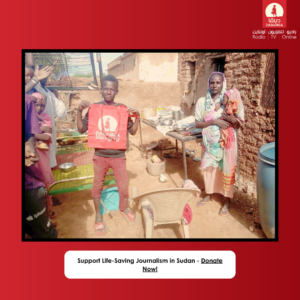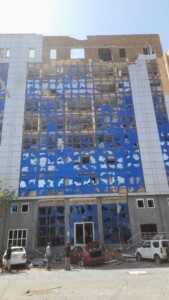Sudanese journalists denounce army accusations
The Sudanese Journalists Network (SJN) has strongly condemned the verbal attack on journalist Adil Ibrahim (known as Adil Kolor) by an army officer in a TV programme on Sunday. The journalist participated in an episode of the programme ‘The Army between Abuse and the Right to Criticism’ on Sudania 24 satellite channel.
 Cartoon by Omar Defallah for Radio Dabanga
Cartoon by Omar Defallah for Radio Dabanga
The Sudanese Journalists Network (SJN) has strongly condemned the verbal attack on journalist Adil Ibrahim (better known as Adil Kolor) by an army officer in a TV programme on Sunday.
The journalist participated in an episode of the programme ‘The Army between Abuse and the Right to Criticism’ on Sudania 24 satellite channel.
In a discussion on Sudan’s military dealing with weapons and explosives during the 1989-2019 regime of ousted President Omar Al Bashir, the journalist spoke about the US missile attack on the El Shifa pharmaceutical factory in Khartoum North in 1998.
He also pointed to the air strikes of 2009 allegedly conducted by Israel against Iranian arms being smuggled through Sudan to Gaza, a missile attack on a land cruiser in Port Sudan in 2011, the 2012 bombing of the Yarmouk ammunition factory in southern Khartoum, which was carried out by Israeli bombers, Sudan said at the time, and the interception of a ship carrying weapons by the Israeli navy in the Red Sea in 2014 .
Maj Gen Amin Ismail reacted to the remarks of Kolor in a later TV programme on Sunday by saying that an official complaint would be filed against the journalist concerning the disclosure of military secrets. He accused Kolor of terrorism, and warned him not to reveal such military details again.
In a statement on Monday, the SJN strongly condemned the threatening of Kolor and “all other attempts to silence journalists and media workers, and keep them from fulfilling their role in informing the public”.
According to the network, “these threats are not different from the targeting of journalists [during the reign of Omar Al Bashir]”.

the mouthpiece of Sudan's Communist Party (sudanews)
The statement further confirmed the filing of complaints by the Sudan Armed Forces (SAF, consisting of the army and the paramilitary Rapid Support Forces) against journalists and activists on the basis of “the defective Information Law” and “an attack on the civil freedoms in the country”.
On Saturday, the SAF announced it has started taking “legal measures against activists, media personnel, and others inside and outside Sudan who insulted the military”. More details would follow “in due course”.
Press Freedom
Sudan’s Prime Minister Abdallah Hamdok said on the occasion of World Press Freedom Day on May 3 that although progress has been made, the press freedom situation in Sudan is “still below the standards set by the transitional government”.
In this year’s World Press Freedom Index, which Reporters Sans Frontières (Reporters Without Borders) compiles annually, Sudan rose 16 places – following the ousting of President Al Bashir in April 2019. In 2019, Sudan occupied number 175 out of 180.
The International Federation for Human Rights and the African Center for Justice and Peace Studies urged UN High Commissioner for Human Rights last week to continue to provide support to Sudan’s transitional authorities.
A “meaningful reform of the security sector”, should, among other things, clarify the Rapid Support Forces’ official status and fully integrate them into the Sudanese Armed Forces, the organisations said.
Radio Dabanga’s editorial independence means that we can continue to provide factual updates about political developments to Sudanese and international actors, educate people about how to avoid outbreaks of infectious diseases, and provide a window to the world for those in all corners of Sudan. Support Radio Dabanga for as little as €2.50, the equivalent of a cup of coffee.












 and then
and then